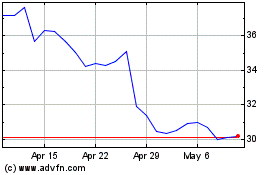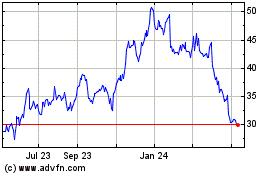By Dan Strumpf in Hong Kong and Asa Fitch in San Francisco
This article is being republished as part of our daily
reproduction of WSJ.com articles that also appeared in the U.S.
print edition of The Wall Street Journal (June 29, 2019).
The U.S. blacklisting of Huawei Technologies Co. is casting a
net that extends far wider than its target: It is curbing the
revenue of American and Japanese electronics companies, cutting
into Taiwanese chip orders and giving Huawei's competitors a chance
to take advantage.
The Trump administration's decision to restrict the sale of U.S.
technology to the Chinese tech giant is hitting American suppliers,
which took $11 billion in orders from Huawei last year. These
include big companies like Intel Corp. and Qualcomm Inc. and
smaller players such as Qorvo Inc., which makes radio-frequency
filters and is more heavily reliant on Huawei.
The ripples have radiated through the global supply chain as the
U.S. campaign wipes millions of units off the company's smartphone
sales and threatens its plans to be the leading global producer of
5G telecommunications-networking equipment.
With a global procurement budget of $70 billion, Huawei is key
to a network of interconnected suppliers across the world. Many
non-U. S. suppliers have reduced exports to Huawei because of
concerns of running afoul of Commerce Department restrictions,
which curb the sale of U.S.-origin technology to the company.
The damage coursing through the supply chain has driven some
suppliers to find ways to resume some shipments without falling
foul of the ban, exporting components manufactured outside the U.S.
with mostly foreign-made parts. Still, tech companies and analysts
remain spooked by the continuing tech fight between the U.S. and
China, and manufacturing may be shifted to avoid being caught in
the crossfire.
Lost revenue for Huawei, the world's largest maker of networking
equipment, could total $30 billion this year and next, Ren
Zhengfei, the company's founder and most powerful executive said
June 17. Smartphone sales fell 40% outside of China in the month
following the U.S. blacklisting compared with the month before, Mr.
Ren said. He later said the slowdown was easing. Huawei was the
world's No. 2 seller of smartphones in the first quarter of this
year.
Huawei's rivals are looking for an advantage. Xiaomi Corp., the
world's fourth-largest maker of smartphones, is budgeting about
$727 million over the next three years to boost smartphone sales in
China and better compete with Huawei on its home turf, a company
spokesman said.
A possible reprieve for Huawei could be on the horizon, as the
Group of 20 summit is held in Japan this week: Beijing has set the
removal of Huawei from the U.S. blacklist as a precondition for any
trade deal with Washington, The Wall Street Journal reported
Thursday.
It is unclear how far resumed shipments would go to ease the
pain of Huawei's blacklisting. On June 21, Drew Nelson, the chief
executive of the U.K. chip wafer maker IQE PLC said the listing "is
having far-reaching and long-lasting impacts on global supply
chains." IQE expects revenue for the year will be less than
previously forecast.
U.K.-based chip-design firm ARM Holdings PLC suspended its
business with Huawei and Dutch chip maker NXP Semiconductors NV
also halted some business with the Chinese company following the
ban. An ARM spokesman said the company remains compliant with U.S.
rules. An NXP spokeswoman didn't respond to a request for
comment.
Orders are falling at Taiwan's chip-making giants, which count
sales to Huawei by the billions of dollars. Mark Liu, chairman of
Taiwan Semiconductor Manufacturing Co., the world's biggest
contract chip manufacturer, said after the company's annual meeting
June 5 that it is seeing lower demand from Huawei, likely due to
slowing smartphone demand and higher inventories. A TSMC
spokeswoman later told The Journal the company regrets the remarks
and doesn't comment on individual customers.
The prospect of Huawei cutting orders of display panels to Japan
Display Inc. led Taiwanese touch-panel maker TPK Holding Co. to
drop out of an investor group planning to bail out the struggling
Japanese company, according to people involved in the bailout
discussions.
For South Korean suppliers, which sell parts to Huawei and its
competitors, the blacklisting presents both pain and opportunity.
They include Samsung Electronics Co., SK Hynix Inc. and LG Display
Co., some of which have production facilities inside China that
aren't likely exposed to U.S. restrictions on selling to Huawei.
While a fall in Huawei smartphone sales could blunt some of those
companies' business, sales of rivals' devices -- which also use
South Korean parts -- could see an uplift.
In the U.S., Qorvo, which makes radio-frequency chips used in
Huawei smartphones, said last month it expected a $50 million
reduction in quarterly revenue due to the Huawei supplier ban. And
Broadcom Inc. cut its revenue estimate for the year by $2 billion
following the Huawei blacklisting, saying it now expects full-year
revenue of $22.5 billion. The company also missed analysts' revenue
targets by $160 million for its fiscal second quarter that ended in
May.
Analog Devices Inc. in May said it expected to generate about
$1.45 billion in revenue during its current quarter, around $100
million less than Wall Street had expected.
Others are experiencing a short-term rise in demand as other
Chinese companies stock up on components in case curbs on U.S.
technology exports are expanded. Ambarella Inc., a U.S. maker of
chips that go into security cameras for several Huawei rivals, is
being asked to ship orders sooner, according to Louis Gerhardy, an
executive at the company. Ambarella is accelerating production, but
demand could shift or drop off if more of its customers get
blocked.
"It makes it more difficult to manage the business," said Mr.
Gerhardy.
In many ways, business is continuing as usual at Huawei. The
company hasn't slowed down production at its smartphone production
plants, partly in anticipation of a pickup in sales in China,
according to a person familiar with the matter.
Huawei's core business serving telecom carriers continues to
sign new contracts for 5G network rollouts, including a 5G deal
earlier this month signed with Russian carrier MTS. The company has
signed 50 such 5G contracts to date.
--Takashi Mochizuki in Tokyo and Timothy W. Martin in Seoul
contributed to this article.
Write to Dan Strumpf at daniel.strumpf@wsj.com and Asa Fitch at
asa.fitch@wsj.com
(END) Dow Jones Newswires
June 29, 2019 02:47 ET (06:47 GMT)
Copyright (c) 2019 Dow Jones & Company, Inc.
Intel (NASDAQ:INTC)
Historical Stock Chart
From Mar 2024 to Apr 2024

Intel (NASDAQ:INTC)
Historical Stock Chart
From Apr 2023 to Apr 2024
